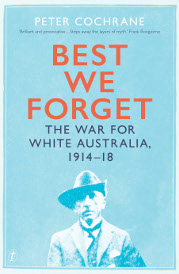
With special guest:
-
Dr Peter Cochrane
… in conversation with Bill Kable
Best We Forget is the title of Peter Cochrane’s new book. This is not the way we are used to thinking about the beginnings of nationhood in Australia. There is a quote from the Australian Prime Minister in 1916, Billy Hughes “I bid you go and fight for White Australia in France.” What was the country thinking at the time?
In our school history classes a familiar topic is the causes of World War 1 but the war was never described as the war for White Australia.
Our guest today has a fascinating insight into some of the less recognised reasons for Australia sending its finest young men to the other side of the world to join the fight among the European powers. It can be argued that Australia lost a generation; no less than 60,000 men died in the conflict and many of the survivors carried physical and mental wounds for the rest of their lives. And this was from a population of about 5 million people.
No doubt the French people who remain grateful for the Australian contribution also wonder what drove the Australians because it is hard to imagine the French Army travelling to Australia to fight for Australian interests. This has fascinated people in more recent times when thinking about World War 1.
The story revealed by Peter Cochrane is that there are other layers to what was driving the Australian representatives. In particular Billy Hughes, born in Wales, used what would now be described as “the race card” to stir up his countrymen in two failed conscription referendums. The worry of the Parliamentarians was that Asia, and in particular Japan, would want to invade Australia and take advantage of the size and wealth of the country that had been colonised by England only 132 years before. Hughes believed that a “blood sacrifice” would help keep Australia “at the table” in any European carve-up of Asian and Australian territory after the war. In doing so he made it difficult for England to develop a good relationship with Japan who was an ally in the War.
Peter takes us right into the thinking of both the main Australian players, Hughes, the Parliament and Cardinal Mannix. We also learn about the reactions of the foreign leaders. After speaking to Peter you start thinking rather than forgetting. This is a fabulous real Australian story that is topical as we come to terms with new leaders and new approaches to our place in the world having sacrificed so many young men and destroyed so many families.
Dr Peter Cochrane
Peter Cochrane’s writing about war includes the award-winning Simpson and the Donkey: The Making of a Legend; the companion volume to the ABC TV series Australians at War; and two studies of wartime photography,The Western Front, 1916-18 and Tobruk 1941. Peter is also the author of Colonial Ambition: Foundations of Australian Democracy, which won the Age Book of the Year award and the Prime Minister’s Prize for Australian History, and two works of fiction: the novella Governor Bligh and the Short Man and the recently published novel The Making of Martin Sparrow.
Song selection by our guest: Gabriel’s Oboe by Enrico Morricone from the soundtrack of The Mission